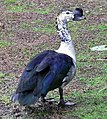Duck
| Ducks | |
|---|---|

| |
| A female and male Mallard | |
| Scientific classification | |
| Kingdom: | |
| Phylum: | |
| Class: | |
| Order: | |
| Family: | |
| Subfamilies | |
Duck is the common name for a number of species in the Anatidae family of birds. The ducks are divided between several subfamilies listed in full in the Anatidae article. Ducks are mostly aquatic birds, mostly smaller than their relatives the swans and geese, and may be found in both fresh water and sea water.
Most ducks have a wide flat beak adapted for dredging. They exploit a variety of food sources such as grasses, grains and aquatic plants, fish, and insects. Some (the diving ducks) forage deep underwater; the others (the dabbling ducks) feed from the surface of water or on land. To be able to submerge easier, the diving ducks are heavier for size than dabbling ducks, and therefore have more difficulty taking off to fly. A few specialized species (the goosander and the mergansers) are adapted to catch large fish.
In a wildlife pond, the bottom over most of the area should be too deep for dabbling wild ducks to reach the bottom, to protect bottom-living life from being constantly disturbed and eaten by ducks dredging.
The sound made by some female ducks is called a "quack"; a common (and false) urban legend is that quacks do not produce an echo.
The males (drakes) of northern species often have showy plumage, but this is moulted in summer to give a more female-like appearance, the "eclipse" plumage. Many species of ducks are temporarily flightless while moulting; they seek out protected habitat with good food supplies during this period. This moult typically precedes migration.
Some duck species, mainly those breeding in the temperate and arctic Northern Hemisphere, are migratory, but others are not. Some, particularly in Australia where rainfall is patchy and erratic, are nomadic, seeking out the temporary lakes and pools that form after localised heavy rain.
In many areas, wild ducks of various species (including ducks farmed and released into the wild) are hunted for food or sport, by shooting, or formerly by decoys. From this came the expression "a sitting duck" to mean "an easy target".
Ducks have many economic uses, being farmed for their meat, eggs, feathers and down feathers. Most domestic ducks were bred from the wild Mallard, Anas platyrhynchos, but many breeds have become much larger than their wild ancestor, with a "hull length" (from base of neck to base of tail) of 30 cm (12 inches) or more and routinely able to swallow an adult British Common Frog, Rana temporaria, whole.
Ducks are sometimes confused with several types of unrelated water birds with similar forms, such as loons or divers, grebes, gallinules, and coots.
Etymology
The word duck meaning the bird, came from the verb "to duck" meaning to bend down as if to get under something, because of the way many species in the dabbling duck group feed by upending (compare the Dutch word duiken = "to dive").
This happened because the older Old English word for "duck" came to be pronounced the same as the word for "end": other Germanic languages still have similar words for "duck" and "end": for example, Dutch eend = "duck", eind = "end"; compare Latin anas (stem anat-) = "duck", Sanskrit anta (masc.) = "end", Lithuanian antis = "duck".
Ducks and humor
In 2002, psychologist Richard Wiseman and colleagues at the University of Hertfordshire (UK) finished a year-long LaughLab experiment, concluding that, of the animals in the world, the duck is the type that attracts most humor and sillyness; he said "If you're going to tell a joke involving an animal, make it a duck." The word "duck" may have become an inherently funny word in many languages because ducks are seen as a silly animal, and their odd appearence compared to other birds. Of the many ducks in fiction, many are silly cartoon characters. See http://www.newscientist.com/article.ns?id=dn2876 (New Scientist article mentioning humor in the word "duck")
Gallery
-
An African Comb Duck
-
Drake Mallard
-
Ruddy Shelduck - not a duck, but a member of the Tadorninae
-
Female Mallard
-
Male Mallard
See also
- Domesticated duck — ducks kept for meat, eggs and down
- List of fictional ducks
External links
- "The quack doesn't echo" urban legend (from Snopes.com)
- Duck Guide
- Duck videos on the Internet Bird Collection
- http://www.thecontentwell.com/Fish_Game/Ducks/Duck_migration.html
- http://soundwaves.usgs.gov/2002/11/fieldwork.html
- http://www.ibiblio.org/pardo/birds/archive/archive2/msg00397.html
- http://www.ducks.org/waterfowling/flyways.asp
- http://www.gamehuntersguide.com/Encyclopedia/Animals/Birds/Diving%20ducks/Tufted%20duck.htm (good for foreign names)
- http://seaducks.org/subjects/MIGRATION%20AND%20FLIGHT.htm (useful looking abstracts)
- http://www.nrdc.org/greengate/wildlife/duckf.asp
- http://www.bbc.co.uk/radio4/science/nature_20030616.shtml (ruddy ducks' impact on white-headed ducks)






